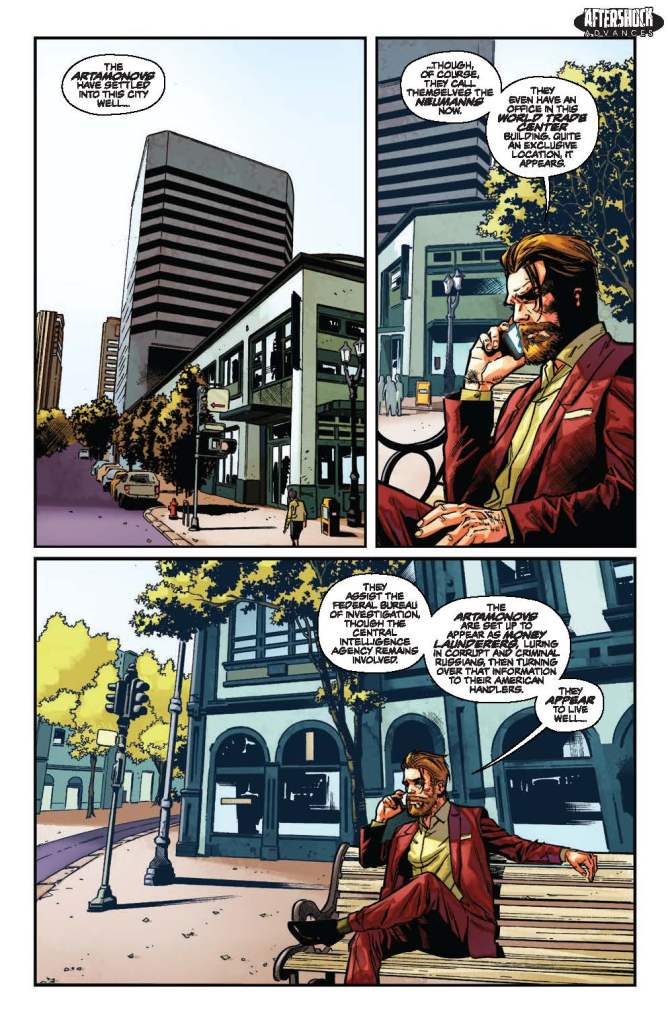Author: Ron Marz
Artists: Marco Castiello, Flavio Dispenza, Juanchoi
Created by Jan Neumann
Aftershock, 2021-2022
TWO PEOPLE SOMETIMES make a pair. Comfortable mates.
Watching the husband-and-wife couple in the first issues of ALMOST AMERICAN as they thread their way from sensitive Russian state intelligence jobs to exile, seeking a new home in America as the only possible safe place to be, was remarkably satisfying moving through mundane settings and bureaucratic delays, partly due to the posture of husband and wife leaning into each other in the simple illustrations, dwelling on details, and also in a persistent thrum through the dialogue as the one encourages the other, we can do this, almost good, stay calm. The pair plan to cooperate with the American Central Intelligence Agency or the Federal Bureau of Investigation or both, and expect to be protected, and disappear.

The title Almost American attracted me as an apt description of my own persona, not wholly comfortable in my American moorings. The couple’s first encounters with American food choices, like burgers and donuts, induced a gag reflex. A similar encounter inspired the 1995 lyrics by David Bowie and Brian Eno that played in my head during the first three unsettled issues, with an electronic beat:
I’m afraid of Americans
I’m afraid of the world
I’m afraid I can’t help it
The story is a real-life drama, captured by expert author Ron Marz after long interviews with the refugee couple. The pace of the dramatization is easy, yet tense. The setting is only tangentially American. The couple’s professional experience involved money laundering and secret funds underlying a robust kleptocracy that exploded in the 1990s and 2000s in both Russia and America, fed by multiple wars, privatizations, and development projects that allowed many billions of currency to leak into personal bank accounts. Fraud and corruption protected by tax havens and lax supervision embroil both countries and others wherever weak government and retarded ethics fester.

Writer Rana Dasgupta recently documented the same capital complaints in the “eruption” of Delhi, India. Elsewhere, African and South American countries and American puppet democracies around the world have long been known for the same ills: a few very rich, rent-seeking elite run governments like a personal piggy bank with connivance from bureaucratic officials and corporate agents. Wherever people feel they need to lie, cheat, and steal to improve their prospects must be considered a failed state, not a model to emulate.
The Almost American couple plan to make a living in America sharing what they know about these shady dealings. By Issue 3 it appears their information helps the FBI catch funds and crooks in organized crime. By Issue 4 they come to Portland, my hometown, where their past catches up with them. They are clearly still alive, there is a picture in the back of Issue 1, so there must be a happy ending.
Politics lurk in the background, yet the story stays firmly attached to the defecting couple poised on a precipice. They get married with their new names. A sweet interlude; Ron Marz is a fine expositer of romantic relationships. The art stream by Marco Castiello is especially absorbing, with people solidly embedded in their settings like a film. Carefully segmented colors by Flavio Dispenza, and later Juanchoi, display complex shades on every surface with convincing authenticity. The real world looks like the real world, only better. Inserting Portland scenes, of course, rocks.

The scary part may be yet to come. The CIA has not yet introduced its own plan how to use the defectors. The subtitle to Issue 4 says ominously: The Cold War Never Ended. It gave a chilling sensation realizing agencies like the CIA and its counterparts in Russia and elsewhere are the main players with an international view and expertise, along with multinational corporations, running data centers, analysts, and operation teams. At this atmosphere, there is no state in view but a sometimes wise though mostly hapless United Nations and International Court that America for one pays no account.
What will the plan be? Maybe disrupt Ukraine to poke the bear, or Xinjiang to rattle the dragon? These things are happening right now. With your money. The American intelligence and war departments are only almost American, based in cells in virtually every country in the world, with no sovereign authority but their own will. I wonder in real life what our almost happy couple will be asked to do next.

